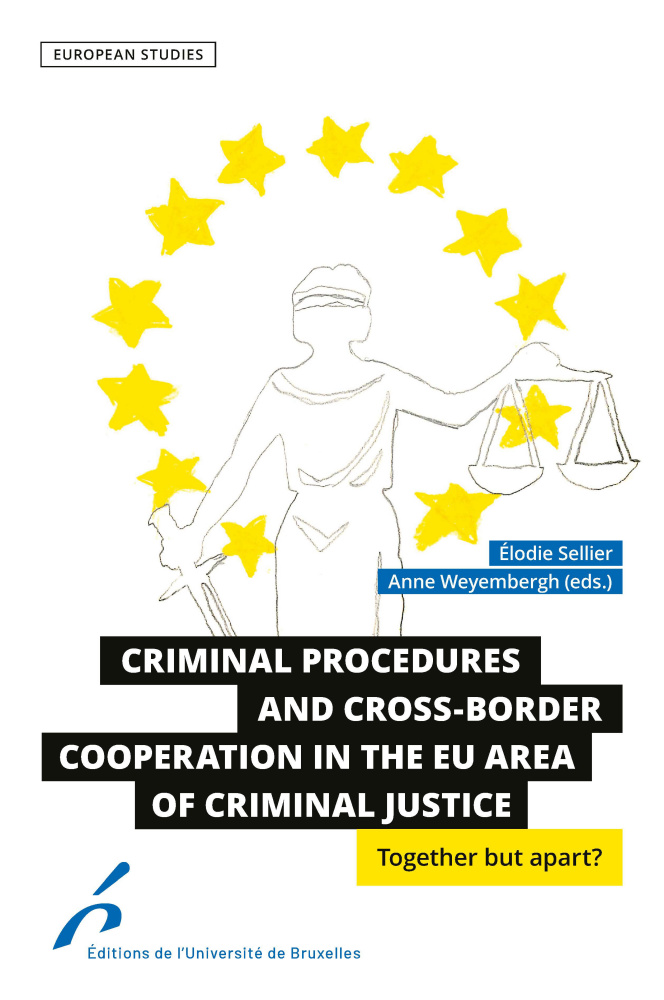Criminal Procedures and Cross-Border Cooperation in the EU Area of Criminal Justice
Together but apart?
This book examines to what extent differences between national procedural criminal laws hinder the negotiations and the operation of cross-border cooperation instruments in the EU area of criminal justice. Lire la suite
For the past decade, judicial cooperation in criminal matters in the European Union has been premised on the principle of mutual recognition. Its operation presupposes the acceptance of mutual trust between the – diverse – legal systems of the Member States. That trust is grounded on their shared commitment to the principles of freedom, democracy, respect for human rights and the rule of law. Since the entry into force of the Lisbon Treaty, the EU legislator has adopted six directives on the procedural rights of defendants, together with one directive on victims' rights. However, against the background of intense legislative activity in criminal matters, illustrated by the adoption of the EPPO Regulation and the release of the E-Evidence Proposal, recent debates questioned whether further approximation efforts should be undertaken in the field of procedural criminal law.
In this context, this edited volume examines to what extent differences between national procedural criminal laws hinder the negotiations and the operation of cross-border cooperation instruments. It is based on a comparative analysis of a representative sample of Member States. It identifies several forms of "hindrances" to cross-border cooperation, ranging from mere delays to the suspension and the non-execution of assistance requests, alongside the striking underuse of some of the existing instruments. There is no simple or single answer to these challenges. Therefore, several non-legislative and legislative recommendations are put forward for the short- and long-term horizon.
Spécifications
- Éditeur
- Éditions de l'Université de Bruxelles
- Édité par
- Élodie Sellier, Anne Weyembergh,
- Avant-propos de
- Pedro Caeiro,
- Introduction de
- Élodie Sellier, Anne Weyembergh,
- Contributions de
- Petra Bárd, Aart de Vries, Joske Graat, Diana Ionescu, Tony Marguery, Daniel Niţu, Alexander Oppers, Élodie Sellier, Perrine Simon, Thomas Wahl, Anne Weyembergh,
- Collection
- Études européennes | n° 66
- ISSN
- 13780352
- Langue
- anglais
- Site web ressource
- Oapen.org
- Mots clés
- migration, Philosophy, sociology
- Catégorie (éditeur)
- > Droit
- BISAC Subject Heading
- LAW027000 LAW / Criminal Procedure
- CLIL (Version 2013-2019 )
- 3280 Droit de l'Union européenne
- Date de première publication du titre
- 20 août 2020
- Subject Scheme Identifier Code
- Classification thématique Thema: Droit international
Paperback
- Details de produit
- 1
- Date de publication
- 23 avril 2023
- ISBN-13
- 978-2-8004-1835-3
- Ampleur
- Nombre absolu de pages : 92
- Code interne
- 1835
- Format
- 16 x 24 x 0,6 cm
- Poids
- 197 grammes
- ONIX XML
- Version 2.1, Version 3
Google Livres Aperçu
Sommaire
Introduction
La langue des journalistes comme pratique régulée
Des entretiens avec des acteurs de cinq sites d'information
Plan de l'ouvrage
Bilan des études consacrées aux discours sur la langue
et sur le journalisme
L'usage de la langue et la pratique du journalisme : deux objets de critiques
La langue des journalistes et ses différentes caractéristiques
Le rapport à la langue des professionnels des médias
La langue dans le travail concret des journalistes
Dispositif méthodologique
PARTIE I | LES REPRÉSENTATIONS LINGUISTIQUES DES JOURNALISTES
EN LIGNE
Chapitre I - Les représentations relatives aux qualités de la langue
des journalistes
Les qualités sociales de la langue des journalistes
Le reflet
Le pouvoir d'influence
La responsabilité sociale
Le devoir professionnel
Les qualités linguistiques de la langue des journalistes
Les discours critiques des internautes vus par les journalistes
Les évaluations relatives au français des journalistes
Les causes des écarts linguistiques données par les journalistes
En conclusion : des conditions de travail opposées au devoir professionnel
Chapitre II - Le rapport à la langue
Les doutes linguistiques
L’imaginaire linguistique
Les considérations communicationnelles
Les considérations relatives à l’utilisation
Les considérations prescriptives
Les considérations émotionnelles
Les concurrences entre différentes considérations
En conclusion : un imaginaire linguistique professionnel complexe
Pour conclure
PARTIE II | LA LANGUE DANS LES RÉDACTIONS WEB
Chapitre I - L’organisation des rédactions web et leurs spécificités
L’organisation des rédactions
DH.be/La Libre.be
Le Soir.be
RTBF Info
RTL Info
Les spécificités du journalisme web
Les conditions de production
La place de l’écriture
L’écriture web
Clic et référencement
Les politiques managériales
Les spécificités éditoriales
Les logiciels d’édition
L’absence de relecteur
Les consignes liées à la régulation linguistique
En conclusion : le management, acteur de la régulation linguistique malgré lui
Chapitre II - Les pratiques individuelles et collectives
Les pratiques de relecture
Le traitement des dépêches
Les interactions au sujet de la langue
Les outils utilisés
En conclusion : les pratiques des journalistes comme facteurs d’autorégulation
Chapitre III - Les retours des internautes
Les internautes comme aides à la correction linguistique
Le désinvestissement des rédactions dans la gestion des commentaires
Vers un dispositif participatif ad hoc ?
En conclusion : des internautes (in)exploités et inexploitables
Pour conclure
Conclusions générales
Bibliographie
Liste des graphiques et des tableaux

